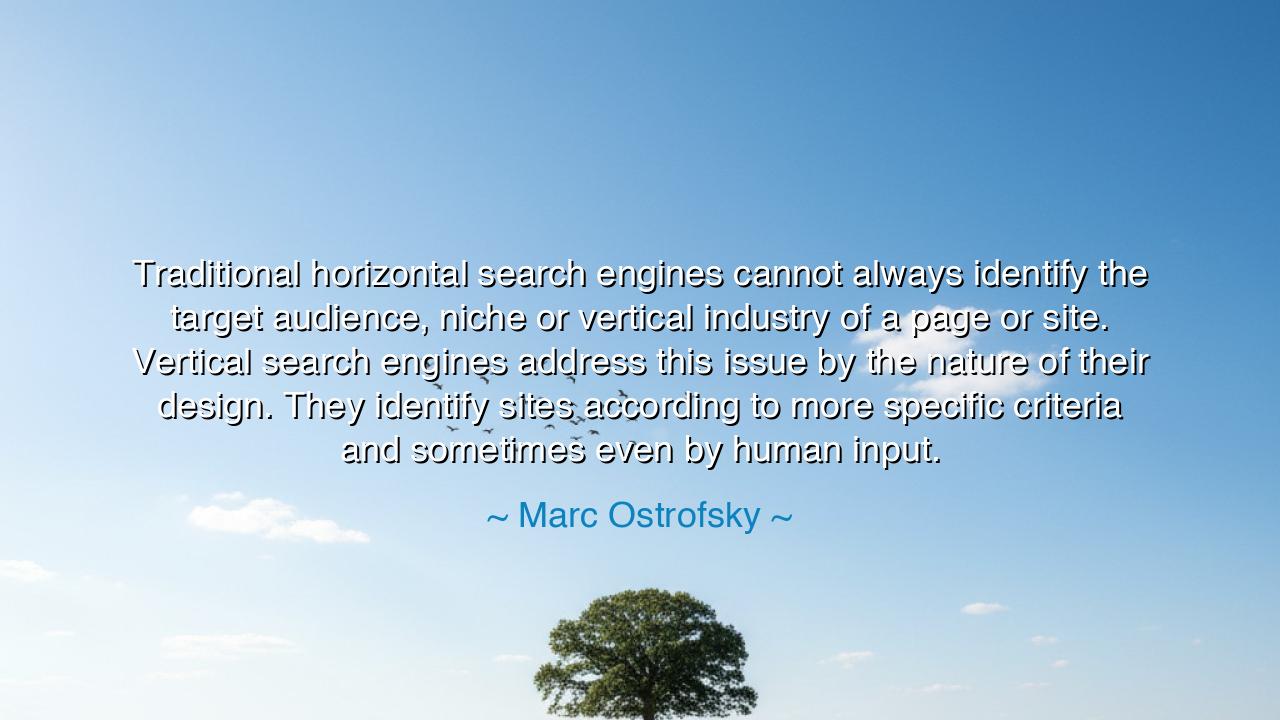
Traditional horizontal search engines cannot always identify the
Traditional horizontal search engines cannot always identify the target audience, niche or vertical industry of a page or site. Vertical search engines address this issue by the nature of their design. They identify sites according to more specific criteria and sometimes even by human input.






Hearken, children of the earth, and consider the words of Marc Ostrofsky: “Traditional horizontal search engines cannot always identify the target audience, niche or vertical industry of a page or site. Vertical search engines address this issue by the nature of their design. They identify sites according to more specific criteria and sometimes even by human input.” In these words lies a lesson on the nature of discernment, focus, and the power of precision in a world overwhelmed with information. The ancients understood that knowledge, to be useful, must be filtered, understood, and applied with purpose; to cast a wide net without direction often yields confusion rather than clarity.
Ostrofsky speaks of the limitations of traditional horizontal search engines, which gather vast quantities of information indiscriminately. Like a fisherman casting his net across the sea without thought, horizontal engines capture all manner of content, yet cannot always discern which insights are most valuable, relevant, or aligned with a specific need. The ancients warned similarly: to collect wisdom without judgment is to invite folly; knowledge must be contextualized and refined before it bears fruit.
The emergence of vertical search engines represents the human desire to impose order, purpose, and discernment upon the chaos of information. Just as scholars of Alexandria catalogued scrolls according to subject, author, and utility, vertical engines classify sites by niche, industry, and audience. In doing so, they provide clarity, precision, and relevance—guiding seekers to exactly what they need rather than what merely exists. This mirrors the ancient practice of careful curation, in which knowledge was organized and made meaningful.
The notion that vertical engines sometimes rely on human input recalls the wisdom of mentorship and guidance in every age. Technology alone, however advanced, cannot entirely replicate discernment; the human eye, the judgment of experience, and the subtle understanding of context remain indispensable. Just as a sage interprets texts with insight and intuition, human-guided curation ensures that digital navigation aligns with purpose, need, and quality.
History offers examples of the power of specialization. Consider the libraries of Baghdad during the Islamic Golden Age, where scholars classified manuscripts according to discipline, topic, and audience. This vertical organization enabled rapid discovery of knowledge, the cross-pollination of ideas, and the advancement of science, philosophy, and art. Like vertical search engines, specialization allowed seekers to find exactly what they needed amidst the vast ocean of information.
The lesson for our modern lives is clear: clarity and precision in pursuit of knowledge are paramount. One must seek not merely breadth, but depth, context, and relevance. By understanding the limitations of broad approaches and embracing tools, methods, or mentors that provide targeted insight, one transforms raw information into actionable wisdom. Just as vertical search engines deliver relevant knowledge with purpose, so too must we cultivate discernment in our learning and decision-making.
Practical application flows from this teaching. When seeking knowledge or solutions, identify the specific need or niche you wish to address. Utilize tools, resources, or guidance that focus precisely on that domain. Filter distractions, evaluate sources, and apply judgment. In doing so, the pursuit of knowledge becomes efficient, meaningful, and aligned with purpose, rather than an overwhelming and aimless gathering of information.
Thus, let the generations to come carry this wisdom: to navigate the vast seas of information, one must value precision, context, and guidance. Marc Ostrofsky’s words remind us that breadth alone does not confer understanding; it is through focused, targeted, and sometimes human-guided exploration that knowledge gains its power, utility, and transformative effect. Seek with discernment, act with purpose, and let clarity be your compass in the oceans of modern thought.
If you wish, I can also craft a more vivid, story-driven version, using historical and modern imagery of knowledge-seekers navigating complexity, designed for audio narration, to make Ostrofsky’s lesson about precision, specialization, and discernment even more immersive. Do you want me to do that?






AAdministratorAdministrator
Welcome, honored guests. Please leave a comment, we will respond soon